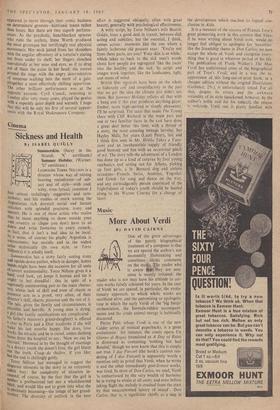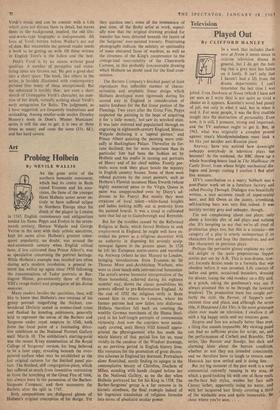Mu s ic
More About Verdi
By DAVID CAIRNS
Pierre Petit, whose Verdi is one of the new Calder series of musical paperbacks, is a great evolutionist; for instance, the comic opera Un Giorno di Regno (translated as A Day of Rain) is dismissed as containing 'nothing but bad Rossini,' though we now know that this is simply not true. I due Forcori (the book's curious ren- dering of I due Foscari) is apparently worth a mention only as proof that Verdi, when he wrote it and the other immediately post-Ernani works, was tired. In most of Don Carlos, we read, Verdi 'is embarrassed by the very wealth of harmony he is trying to attain at all costs; and even before taking flight the melody is crushed from the start by that unaccustomed luxury of sound': boa Carlos, that is, is significant chiefly as a step in
the development which reached its logical con- clusion in Aida.
It is a measure of the success of Francis Toye's great pioneering work in this country that Toye, if he were writing about Verdi now, would no longer feel obliged to apologise for `banalities' like the friendship theme in Don Carlos; we now accept the whole of Verdi and recognise every- thing that is good in whatever period of his life. The publication of Frank Walker's The Man Verdi has undermined some of the biographical part of Toye's Verdi, and in a way the re- appearance of this long-out-of-print book, in a cheaper edition without the original illustrations (Gollancz, 25s,), is unfortunately timed. For all that, despite its errors and the awkward rotundity of its style (quickened, however, by the author's noble zeal for his subject), the reissue is welcome. Until. one is pretty familiar with Verdi's music and can be content with a Life which goes not discuss them in detail, but leaves them in the background, implied, the old life- and-works-type biography is indispensable. All lives of Verdi written before Walker's are out of date. But meanwhile the general reader needs a book to be getting on with. Of those written in English Toye's is the fullest and the best.
Petit's Verdi is by no means without good qualities. A number of perceptive and stimu- lating ideas are thrown out. He gets a good deal into a short space. The book, like others in the series, is lavishly illustrated with contemporary pictures (too many of them uricaptioned). But the substance is terribly 'thin: not even a short sketch of Giuseppina Verdi's character, no men- tion of her death, virtually nothing about Verdi's early antagonism for Boito. The judgments, as I have suggested, are frequently tendentious and misleading. Among smaller-scale studies Dyneley Hussey's book in Dent's `Master Musicians' series is still the one to get; it is two or three times as meaty and costs the same (11s. 6d.), and has hard covers.































 Previous page
Previous page